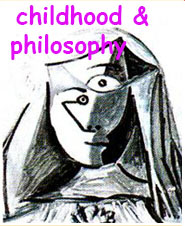erratic lines: cartographies of another way of existing in (life and) school
DOI:
https://doi.org/10.12957/childphilo.2018.36041Keywords:
Estudos da Infância, Redes, DiferençaAbstract
In dialogue with Gilles Deleuze, this article seeks to discuss the ideas of Fernand Deligny and his contributions to think the (re) invention of the school based on children (autistic or not) who present another way of existing in school and in life: those that inhabit school life with their differences. In the present text, we bring forth two experiences that are being made with children, autistic or not, in public schools in the Metropolitan Region of the State of Rio de Janeiro, one in Niterói and another in the Baixada Fluminense. In the effort of abandoning the logics and practices of the "thought project", we are open to an inventive encounter, that is, one that creates what it finds, because the network's goal is not to capture the object, but to weave singular existences. The present theoretical intersection allows us to be with the child in the sense of permitting, accompanying, wandering with them, which constitutes another approach. Deleuze states that children wish to constitute their maps, their paths through and between the real and the virtual, the adults also being ways to be travelled. Therefore, in a relationship with them, we do not have to interpret their wordings, but to perceive and invest in their and our displacements. A fierce opponent of institutions of all kinds, Deligny makes a radical critique of positivist educational conceptions and rejects the vision of autism and cognitive deficits as pathological deviations from a preexisting norm. Deligny perceived autism as a singular production of existence. To him, it was not a matter of forcing autistic individuals (who do not speak) with whom he worked to conform to the standards of language, but to devise a way that would allow us to exist with them, even if it meant changing our own way of existing. Also, it is not a matter of "resocializing" or governing the children of favelas exposed to social risk, but of a fragile work of being with them in their “tessituras” of places or policies of proximity. Deligny and Deleuze point out that being with children can mean to accompany, to trace, to go with the difference surrounding alterity and the attempts of an acting that does not fit in, that does not contain or delimit itself and others by contexts.Downloads
Download data is not yet available.
Downloads
Published
2018-09-13
How to Cite
ALVES, Luciana pires; PÉREZ, Carmen lúcia vidal. erratic lines: cartographies of another way of existing in (life and) school. childhood & philosophy, Rio de Janeiro, v. 14, n. 31, p. 575–594, 2018. DOI: 10.12957/childphilo.2018.36041. Disponível em: https://www.e-publicacoes.uerj.br/childhood/article/view/36041. Acesso em: 9 may. 2025.
Issue
Section
dossier




